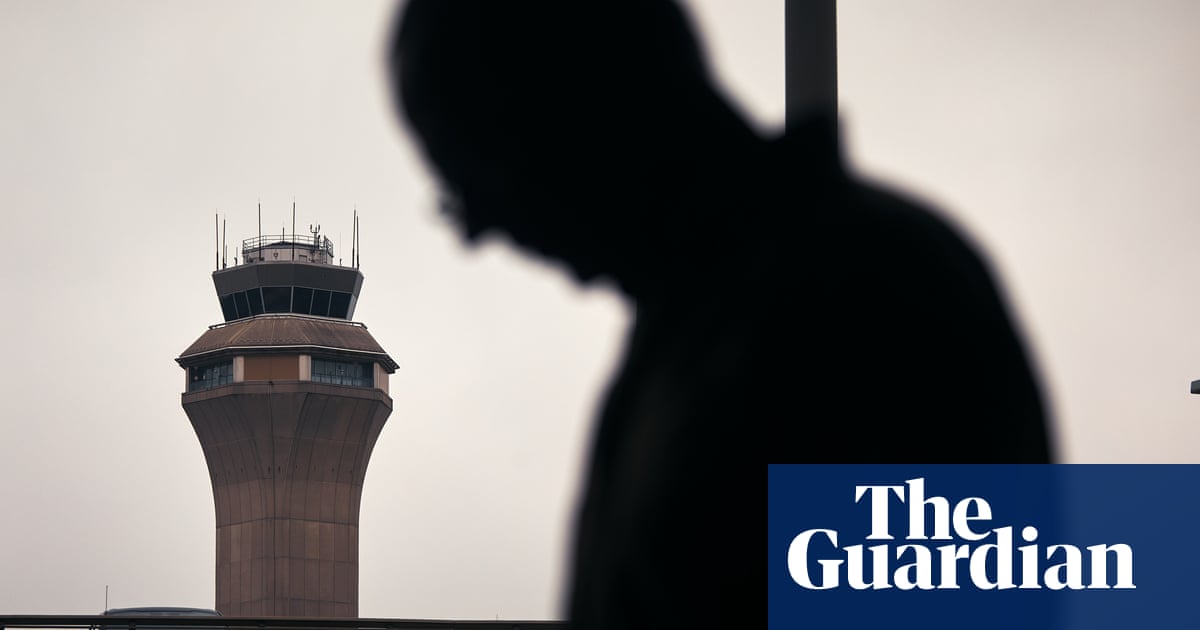New Jersey’sNewark Liberty airport, one of three major airports serving New York City, had just three air traffic controllers on duty on Monday, which was well short of the 14 called for and forced air regulators to delay arriving flights for up to seven hours.
The air traffic controller shortfall, first reported bythe New York Times, comes amid a growing number of problems for the hub. In a little more than a week, Newark has suffered three communications blackouts, rendering the control tower unable to track or communicate with planes for up to 90 seconds.
The most recent failure, on Sunday morning, came as government and airline officials have made multiple efforts to reassure airline passengers that flying into or out of the airport is safe.
But on Monday evening, during the 3pm to 10pm shift, the group that manages Newark air traffic from Philadelphia was operating with one or two fully certified controllers, the outlet reported – far fewer than the 14 controllers agreed on between the controllers union and air traffic control regulators.
The transportation secretary, Sean Duffy, on Monday said a new software update had prevented the previous day’s issues from multiplying after aviation officials issued a 45-minute ground stop.
Ina statement, the Federal Aviation Administration (FAA) said it “briefly slowed aircraft in and out of the airport while we ensured redundancies were working as designed.
“Operations have returned to normal.’’
That came after Duffy announced plans to reduce the number of flights arriving and departing from Newark for the “next several weeks” and would meet with the airport’s major carriers to discuss the issues. Flight reductions, he said, would target the hours when international flights arrive.
Duffy said he wanted to raise the mandatory retirement age for air traffic controllers from 56 to 61, to help offset a shortage of about 3,000 air traffic controllers. After the first Newark failure, on 28 April, the union representing air traffic controllers said several members were placed on trauma leave.
“While we cannot quickly replace them due to this highly specialized profession, we continue to train controllers who will eventually be assigned to this busy airspace,” the FAA said earlier in May.
The problems at Newark appear to be related to copper wiring at Philadelphia Tracon Area C, which guides aircraft in and out of Newark airspace. Tracon is an acronym for Terminal Radar Approach Control Facility.
The FAA has installed new fiber optic lines at Newark airport and New York’s Kennedy and LaGuardia airports to replace copper wires. But the plan is to spend the next two weeks testing those new lines out before switching over to them.
Duffy recently laid out an extensive plan to replace the nation’s outdated air traffic control system, including installing 4,600 new high-speed data connections and replacing 618 radars.
He has sought to blame the issues on the failures during the Biden administration that oversaw a move of air traffic control for the airspace control from Long Island to Philadelphia that he said was “bungled”.
A spokesperson for Pete Buttigieg, the transportation secretary during Joe Biden’s presidency, said Duffy “needs to spend more time doing what the American people are paying him to do – fix problems – and less time blaming others.”
But the issues are creating anxiety for travelers. Hundreds of flights were delayed on Sunday at Atlanta’s Hartsfield-Jackson because of a runway equipment issue. In late January in Washington DC, an American Airlines jet from Wichita collided with a military helicopter, killing 67. The fatal crash has been blamed on the helicopter pilot’s failure to heed air traffic controllers’ instructions.
Despite Newark’s problems, both technical and in terms of the numbers of air traffic controllers available, officials are trying to quell rising airline customer concerns.
“It’s problematic, but our commitment is always safety,” Duffy said on Monday. “We’re going to make sure that if you fly, you’re going to fly safely. And if we reduce the number of flights at Newark, we’re not doing it to annoy people. We’re not doing it to delay people’s travel. What we’re doing is guaranteeing safety.”
Separately, Newark’s mayor, Ras Baraka, told MSNBC on Sunday that the inconvenience of flight delays and cancellations was offset by an emphasis on safety.
“I would be concerned if they weren’t delaying and canceling flights, given the amount of disruption that we’re seeing,” Baraka said. He added he was glad that the Trump administration had “moved away” from claiming diversity initiatives were to blame for the problems and “understanding the structural problems that exist there, the fact that we need more air traffic controllers”.
“There’s too many planes in our airspace, frankly,” Baraka added. “We need to put a gap between the time planes are leaving and coming in to the airport. We need to fly fewer planes until we get this thing under control. The fact that there are delays and cancellations is because they’re doing this day by day.”
